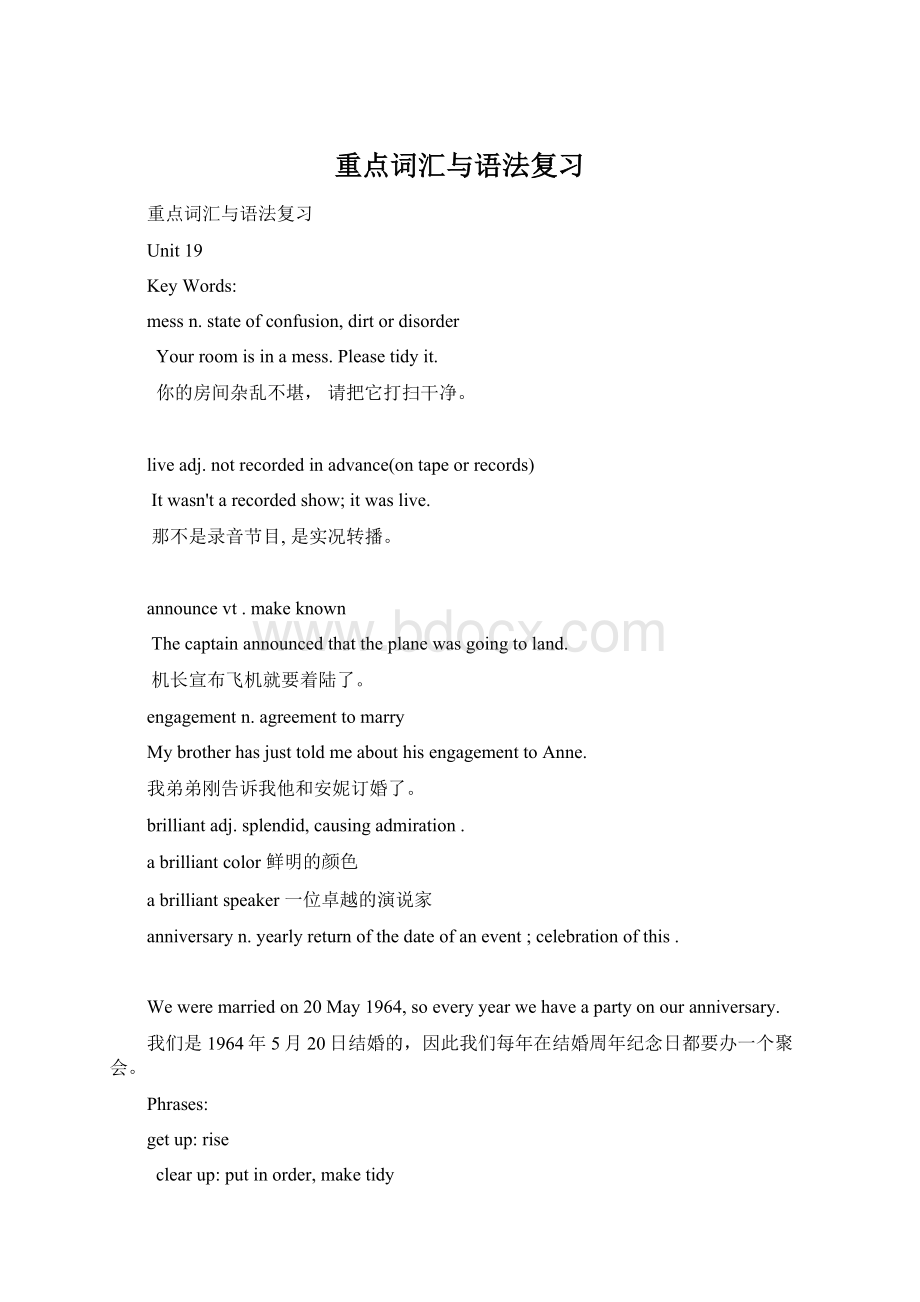重点词汇与语法复习.docx
《重点词汇与语法复习.docx》由会员分享,可在线阅读,更多相关《重点词汇与语法复习.docx(17页珍藏版)》请在冰豆网上搜索。

重点词汇与语法复习
重点词汇与语法复习
Unit19
KeyWords:
messn.stateofconfusion,dirtordisorder
Yourroomisinamess.Pleasetidyit.
你的房间杂乱不堪,请把它打扫干净。
liveadj.notrecordedinadvance(ontapeorrecords)
Itwasn'tarecordedshow;itwaslive.
那不是录音节目,是实况转播。
announcevt.makeknown
Thecaptainannouncedthattheplanewasgoingtoland.
机长宣布飞机就要着陆了。
engagementn.agreementtomarry
MybrotherhasjusttoldmeabouthisengagementtoAnne.
我弟弟刚告诉我他和安妮订婚了。
brilliantadj.splendid,causingadmiration.
abrilliantcolor鲜明的颜色
abrilliantspeaker一位卓越的演说家
anniversaryn.yearlyreturnofthedateofanevent;celebrationofthis.
Weweremarriedon20May1964,soeveryyearwehaveapartyonouranniversary.
我们是1964年5月20日结婚的,因此我们每年在结婚周年纪念日都要办一个聚会。
Phrases:
getup:
rise
clearup:
putinorder,maketidy
growup:
becomeadultormature
turnup:
makeone’sappearance
helpsb.dosth.:
帮助某人做某事
helpsb.withsth.:
在某方面帮助某人
forages:
很长时间
forhours:
好几个小时
tripover:
catchone’sfoot,etcinanobstacleandstumble.
Grammar:
Thesimplepasttense(一般过去时)
thepasttenseformsoftheregularverbs
ask-askedtrip-trippedtry-triedarrive-arrived
thepasttenseformsoftheirregularverbs
go-wenteat-atedrink-drunksee-saw
一般过去时的否定式
助动词do的过去式did+not(didn’t)
be的过去式was+not(wasn’t)或were+not(weren’t)
情态动词can的过去式could+not(couldn’t)
一般过去时疑问句
助动词、情态动词的过去式+主语+动词原形
Didyouhaveagoodtime?
Yes,Idid./No,Ididn’t.
Wassheattheparty?
Yes,shewas./No,shewasn’t.
一般过去式的特殊疑问句
疑问词+助动词/系动词+主语+动词原形
Wheredidyougo?
Whatdidyoudo?
Whodidyoutalkto?
Whenwereyouborn?
Unit20
KeyWords:
Adventuren.vstrangeorunusualhappening,esp.anexcitingordangerousjourneyoractivity.
Allthechildrenlistenedtohisadventureswitheagerattention.
孩子们注意力十分集中地听他讲他的冒险经历。
Thrillern.novel,playorfilminwhichexcitementandemotionalappealaretheessentialelements.
惊险读物、电影、戏剧tragedyn.playorcinema,TV,ofaseriousorsolemnkind,withasadending.悲剧;悲惨的事;惨案;悲剧性作品;悲剧体裁
admissionn.beingadmittedtoasociety,aschool,abuildingetc.;feeorchargeforthis.Admissionbyticketonly.凭票入场。
Admissiontotheconcertcosts£5.音乐会的入场券是五镑一张。
mysteryn.sth.ofwhichthecauseishidden;conditionofbeingsecretorobscure.Whohadtakenthebook?
Itwasamystery.
谁把书拿走了?
这是个谜。
Careern.wayofmakingaliving;profession.
Mygrandfatherwasacareerteacher;it'stheonlyjobhe'deverdone.
我祖父教了一辈子书,教书是他所干过的唯一的工作。
Thecommontypesoffilm
常见电影类型
actionfilm动作片
horrorfilm恐怖片
thriller惊险片
sci-fifilm科幻片
costumedrama古装剧
romanticcomedy浪漫喜剧片
cartoon卡通片
不定代词anything,something,nothing的用法
一般情况下,something,nothing也常用于肯定句,而anything则用于否定句;形容词修饰不定代词时应放在其后面.
连词but,although,because的用法
三者都用来连接两个分句;although和but都可连接两个具有对比意义的句子,because用于连接因果关系的句子;although相当于“虽然…,但是…”在英语中不能与but同时使用.but开头的句子放在后面,而后两者开头的句子可放在句首,用逗号分开两个句子.
提出建议
有5种方法如下:
Howaboutdoingsth.?
Whataboutsth.?
Whydon’twedosth.?
Shallwedosth.?
Let’sdosth.
回复建议并表达个人偏好
表示同意对方建议时,说:
Ok./Okthen./That’sabrilliantidea./That’safantasticidea.
表示不同意对方建议时,说:
I’dprefertodosth../I’dratherdosth.orI’drathernotdosth.
Unit21
KeyWords:
Affordv.haveenoughmoneytobuysth.orforsth.
Hecanaffordanapartment.他能买得起一套住房。
Intendvi.haveinmindasapurposeorplan
Today,Iintendtofinishreadingthisbook.今天我打算读完这本书。
Confirmvt.makeopinions,feelings,etc.firmerorstronger.
Pleaseconfirmyourtelephonemessagebywritingtome.
请给我来封信,好进一步证实你在电话中传达的消息。
Equipmentn.thingsneededforapurpose.
Ourschoolhasbeengivensomenewequipment.
我们学校有了一些赠送的新设备。
Rehearsaln.trialperformanceofaplayorotherentertainment.
wewillhavearehearsalforthegigat8.00.
我们将在八点钟为演唱会排练。
Brochuren.short,printedarticleinapapercover;pamphlet.
aholidaybrochure假日指南
DoyouknowtheEnglishnamesoftheseinstruments?
DrumGuitarsaxophonePianoTrumpet
Violin
Grammar:
Multi-wordverbs短语动词
由动词加介词或副词组成的固定结构,如:
comecross;ringback;pickup;takepartin
三种表示将来的用法:
will/begoingto/现在进行时
现在进行时用来表示已做好的安排:
I’mvisitingmyunclethisyear.今年我要去看望我叔叔。
Tobegoingto用来表示预先计划好的事情,强调打算、计划性。
I’mgoingtovisitmyunclethisyear.今年我计划去看望我叔叔。
Will用来表示说话时即时决定做的事情,预先没有安排。
I’mhungry.IthinkI’llmakedinner.我饿了,我想我得去做饭了。
Unit22
KeyWords:
internationaladj.existing,carriedonbetweennationse.g.aninternationalagreement国际协定
fluentadj.abletospeaksmoothlyandreadilye.g.Heisfluentinfivelanguages.他能流利地说五种语言。
eventn.happening,usuallysth.important
e.g.thechiefeventof19921992年大事
Thenexteventwillbethe100yardsrace.下一个比赛项目是100码赛跑。
Learnsomewordsaboutdifferentsports
gymnastics体操rubgy橄榄球
bowling保龄球yoga瑜珈
snooker台球karate空手道
aerobics/athletics田径运动
KungFu中国武术icehockey冰球
motorrace汽车赛bungeejumping蹦极跳
mountaineering登山运动
Grammar:
形容词的比较级和最高级单音节形容词和部分双音节形容词在词尾加-er和-est构成比较级和最高级。
如:
原级rich比较级richer最高级richest
多音节形容词在原级前面加more和most构成比较级和最高级。
如:
原级dangerous比较级moredangerous最高级mostdangerous
有些形容词的比较级和最高级的变化是不规则的,如:
原级good比较级better最高级best
副词的种类
时间副词:
表示动作发生的时间,如already,still,now,before,today,lastyear,then等,一般放在句首或句尾。
地点副词:
表示动作发生的地点,如downstairs,around,here,there,near,away,down等通常置于句尾。
程度副词:
表示事情或动作的程度,如really,very,just,too,quite,much,definitely等,一般放在被修饰的形容词或副词之前。
频度副词:
ever,often,sometimes,never,occasionally,always,usually等一般放在行为动词之前,动词宾语之后或句首。
方式副词:
表示行为方式,如slowly,quickly,well,badly等一般放在动词(动词加宾语)之后。
现在完成时
现在完成时的构成:
现在完成时由助动词have/has加动词过去分词构成,即have(has)+过去分词。
否定式:
have(has)+not+动词过去分词;疑问式:
have(has)+主语+动词过去分词。
现在完成时的用法:
表示过去发生的动作或事情对现在或将来的影响或产生的结果。
如:
Haveyoueaten?
(ifnot,wecaneatnow.)
表示某人的经历。
如:
I’vebeentoBeijing.
Unit23
KeyWords:
hugeadj.:
verygreat
e.g.TheTVplaywasahugesuccess.
这部电视剧取得了巨大的成功。
tightadj.:
fastened,fixed,held,closely.
e.g.Tightshoescanhurtyourfeet.紧鞋子可能弄伤你的脚。
fashionableadj.:
followingthefashion.
e.g.Shortskirtsarefashionablenow.现在短裙很时髦。
starve.vi.:
feelveryhungry,sufferfromhunger.
e.g.She'slonely,andstarvingforcompanionship.
她很寂寞,渴望友谊。
Grammar:
多个形容词做修饰语时的位置
多个形容词修饰同一个事物时,往往有一定的顺序如下:
长度、高度、形状等+颜色、性质、式样等+材料+物体。
Mylongblacksilkskirt
abigredbus
along,baggyT-shirt
物主代词
有形容词性物主代词和名词性物主代词。
形容词性物主代词:
myyourhisherourtheirits
名词性物主代词:
mineyourshishersourstheirs-
重点词汇与语法复习
Unit25
KeyWords:
Simplifyvt.makesimple;makeeasytodoorunderstand.
TheEnglishinthisstoryhasbeensimplifiedtomakeiteasiertounderstand.
这个故事里的英语被简写了,可更容易理解。
Accessn.way(in)toaplace.Thereisnoaccesstothestreetthroughthatdoor.
穿过那个门没有通向大街的路。
Participantn.personwhotakespartin(sth.)
IaskSusanforlistofparticipants.我向苏珊要参加者名单.
Demonstratevt.:
showclearlybygivingproofsorexamples.Hedemonstratedhowtousethenewmachine.
他演示怎样使用这台新机器。
Grammar:
反身代词
反身代词单数:
myself,yourself,himself,herself,itself
反身代词复数:
ourselves,yourselves,themselves.
反身代词用作状语时,常常起强调的作用,译为“亲自”或“自己”如:
Ididitmyself.这是我自己做的。
反身代词用作动词的宾语时,不能省略。
如:
Hehurthimself.他把自己伤了。
反身代词常常和介词一起使用。
如:
Shecookedamealforherself.她为自己做了饭。
Either,either…or,eitherof…的用法
这几个词(组)用于表示两者之间的选择。
如:
Thenewwebpagecanbeeitherblueorred.
Caneitherofyoucometothemeeting?
Neither,neither…nor…,neitherof…的用法
Neither意为“两者都不”,与“either”相反。
如:
Ithasneitherconferenceroomsnoremailfacilities.
Whichofthesenewspaperswouldyoulike?
Neitherofthem,thanks.
Both,bothof…,both…and…的用法
Both用来指两者,也可以用在bothof…,和both…and…的结构中。
Ilikebothoftwobooks.BoththeEiffelandtheConcordehaveemailfacilities.
Unit26
KeyWords:
reservevt.:
store,keepbackorsecuretherighttousebyadvancepayment.e.g.Ihavereservedaroomforyouatthehotel.我已在旅馆为你预订了一个房间。
supposevt.:
takeitasafactthat;think,guess.e.g.Supposeacompanyhasanewbreakfastcerealthatitwantstosell.假设有个公司想出售一种新的早餐麦片粥。
decisionn.:
deciding,judging,settlementofaquestion.e.g.Shecouldnotmakeadecisionaboutthedresses.她对(买不买)这衣服下不了决心。
improvementn.:
improvingorbeingimproved.e.g.Muchimprovementhasbeenmadeinthepublicorderofthecity.这个城市的治安有了很大的改进。
Grammar:
现在完成时与一般过去时的区别
1、现在完成时用于表示过去的经历或过去发生的动作或事情对现在和将来的影响或所产生的结果,着眼点在现在。
一般过去时指发生在过去的动作或状态,着眼点在过去。
2、现在完成时不能与表示过去的特定的时间状语连用。
如:
Shehascollectedmyvisa.(soIdon’thavetoworryaboutthatanymore.)她已经拿到了我的签证。
(所以我不用再为此担心了。
)
IspoketoMaryinParislastnight.
情态动词
Can,could,may,might,must都是情态动词,可以表示推测。
如:
Hecouldbeathome.(表示有可能)
Shecan’tbeateacher.(语气很肯定)
Johnmustbeinhisseventies.(确信)
情态动词+现在完成时表示对过去事情的推测。
Couldhavedone…表示推测,但可能性较小,有时表示一种惋惜之情;musthavedone…表示对过去行为的推断,具有较大的可能性;shouldhavedone…表示应该做的事而没有做。
Hemusthaveleftitintheshop.他一定把它丢在了商店。
Hecouldhaveleftitintheshop.他可能把它丢在了商店。
Heshouldhaveleftitintheshop.他应该把它留在商店。
不定代词
Anything,everything,something,nothing,anybody/anyone,everybody/everyone/someone/somebody,nobody/noone以-thing结尾的指物或事情,而以-body/one结尾的不定代词专指人。
不定副词
Everywhere,nowhere,somewhere,anywhere在句中用作状语。
如:
Theylookedeverywhere.
Helivessomewherearoundhere.
I’mgoingnowhereuntilyouareback..
Unit27
KeyWords:
Definitelyadv.:
inadefinitemanner.e.g.Heisdefinitelycoming.他一定来。
impatientadj.:
notpatient,eager.e.g.Theyaregrowingimpatient.他们渐渐不耐烦了。
anxiousadj.:
troubled,feelinganxiety.e.g.Hewasanxiousforhersafety.他担心她的安全。
impressionn.:
effectproducedonthemindorfeelings.e.g.WhatwereyourfirstimpressionsofLondon?
你对伦敦的最初印象如何?
i